Happy 36th Birthday to the pious, dedicated family man Khabib Nurmagomedov, who also happens to be a UFC Hall of Famer, and is considered one of the finest mixed martial artists ever to compete. The only UFC champion ever to retire with the belt and with an undefeated record (29-0), Nurmagomedov’s 13 UFC bouts saw him lose only a single round, much less a single fight. This string of dominance included four title fights, the longest reign of dominance in the UFC’s lightweight division. READ more… (1988)

Hailing from the Caucasus region of Russia known as Dagestan, Khabib is a pious Muslim and became the first UFC champion to hold the faith. As is common with many children in Dagestan, he began wrestling from an early age: he started at the age of eight under the tutelage of his father, Abdulmanap Nurmagomedov.
A decorated athlete and a veteran of the Soviet Army, Abdulmanap had also wrestled as a child before undergoing training in judo and sambo in the military. Abdulmanap dedicated his life to coaching the youth in Dagestan, in hopes of offering an alternative to the Islamic extremism common to the region. At age nine, Khabib trained with a juvenile bear as a sparring partner.
This wrestling base was to be Khabib’s weapon of choice in the octagon, a weapon which no opponent ever found a counter to. Abdulmanap remained Khabib’s trainer and cornerman for his whole career, until he passed away after contracting COVID-19 in 2020. Khabib won the following title match against Justin Gaethje at UFC 254, and retired after another, devasting victory.
MORE Good News on this Day:
- Led Zeppelin (going by the name, The Yardbirds) started recording their debut album in London, and took only 36 hours of studio time, with most of the tracks being recorded ‘live’ in the studio with very few overdubs (1968)
- Billie Jean King beat 55-year-old Bobby Riggs in straight sets in a battle-of-the-sexes tennis match watched by a worldwide television audience of 50 million people in 37 countries (1973)
- The first wave of Southeast Asian “boat people” arrived in San Francisco under a U.S. resettlement program (1977)
- A multinational UN peacekeeping force landed in East Timor to restore order and help establish a new peaceful government; a society was successfully rebuilt (1999)
- Don’t Ask Don’t Tell, the Pentagon’s law against openly gay service members, officially ended (2011)
766 years ago, the Salisbury Cathedral was consecrated in England. Considered the oldest example of early Gothic architecture in England, the old beauty maintains the largest cloister, the tallest spire, and the largest external park or “cathedral close,” of any cathedral in Britain. Inside are also one of the oldest continual-working clocks, and one of the 4 surviving copies of the Magna Carta.
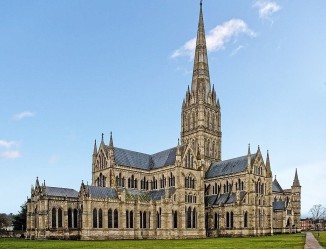
Construction was paid for by donations, principally from the canons and vicars of southeast England, who were asked to contribute a fixed annual sum until the building was completed. A legend tells that the Bishop of Old Sarum shot an arrow in the direction he would build the cathedral; the arrow hit a deer, which died in the place where Salisbury Cathedral is now.
It was reputed to sit on a ley line that also connected it with nearby Stonehenge, and the previous shire cathedral at Old Sarum. Several old Gothic cathedrals in England have suffered the destruction of their spires, since they were built so high at a time when buttressing had not been thought of. As such, the spire at Salisbury became the largest in England almost 300 years after it was built, since the spire of Old St. Paul’s in London collapsed.
This fact was discovered by architect Christopher Wren in 1668, and additional beams hidden above a false ceiling saved the Salisbury spire from the same fate. (1,258)
78 years ago today, the first Cannes Film Festival (Festival International du Film) was held in the sunny seaside city of Cannes, France.
Previewing all genres of film, including documentaries and even student films, from around the world, the annual event is now held at the Palais des Festivals, which was expressly constructed for the occasion. More than a thousand films are marketed here every year for distribution, as well.
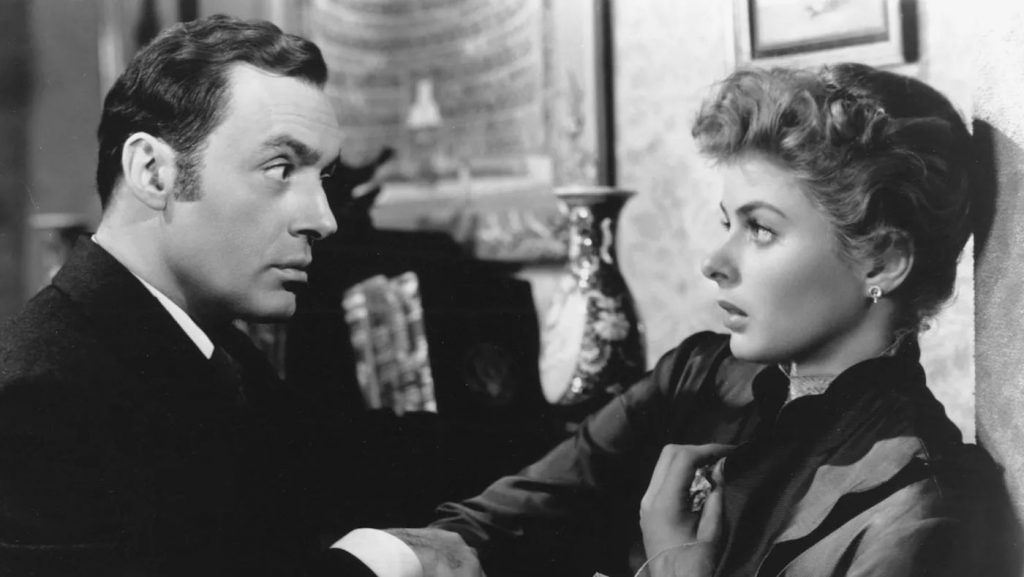
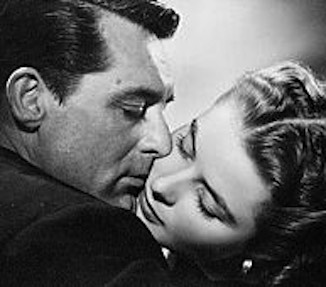
The Lost Weekend directed by Billy Wilder, which portrayed alcohol addiction, won a Grand Prize—and its star Ray Milland, won Best Actor. Other American films nominated were Gaslight (pictured above) by George Cukor and Notorious by Alfred Hitchcock. (1946)
Happy 90th Birthday to Sophia Loren, the Italian actress who won an Academy Award for her lead in the 1962 film Two Women. With that statue in hand, she became the first actress to win an Oscar for a non-English-speaking performance. (1934)

54 years ago today, the Russian space probe Luna 16 landed on the Moon, the first time an unmanned probe was used to take photos and bring objects back to Earth from space.

Also known as Lunnik 16, part of the Soviet’s Luna program, it became the first robotic probe to land on the Moon and return a sample of lunar soil to Earth—but only after trying and failing five times, according to This Day in Space. By that time, NASA astronauts had already collected lunar soil samples, on the Apollo 11 and Apollo 12 missions. WATCH the video… (1970)
And on this day in 1998, Cal Ripken Jr. ended his “iron man” streak, one of the most amazing feats in sports history, after playing in a record 2,632 consecutive baseball games over 16 seasons for the Baltimore Orioles.

The televised game still ranks as one of the most watched baseball events, with Cal’s kids throwing out the first pitch. In the fifth inning, as it was tallied a full game, the crowds in the stands, the opposing players, and the four umpires gave Ripken a standing ovation lasting more than 22 minutes, one of the longest ovations for any athlete. ESPN never went to a commercial break as Ripken walked around the edge of the entire field to shake hands and give high-fives to fans.
Cal, whose talents and personality are praised in the video below, authored a motivational book, Get in the Game: 8 Elements of Perseverance That Make the Difference—and a series of young adult fiction books about playing baseball. (Featured photo by Rdikeman, CC)
Also, on this day, 505 years ago, the Portuguese explorer Ferdinand Magellan set sail on the Atlantic from Sanlúcar de Barrameda, Spain—an expedition that circumnavigated the globe for the first time.
A hardy sailor at a young age, Magellan was born into a Catholic society that believed it was their mission to convert the world to Christianity—but there was another goal. Seven years earlier, he captained a voyage to the legendary Spice Islands in Asia (the Moluccas), home to nutmeg and clove trees. These precious exotic flavors were worth their weight in gold—and Magellan’s share in their sale back in Europe sparked his desire for more wealth. Extremely charismatic, he convinced the King of neighboring Spain to bankroll his latest expedition—to discover a new passage to the Spice Islands, between the Atlantic and Pacific oceans, which would avoid Portuguese battle ships in the southern horn of Africa.
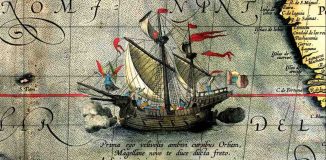
The 270 men carried supplies to sustain two years of travel aboard five ships, but they were essentially “wooden tubs” that had no toilets, privacy, or kitchens on board—and as the mood soured, a mutiny broke out. Despite that, the tenacious Magellan reached the southern tip of South America and discovered a cape. His fleet sailed into the labyrinth of unpredictable winds and currents at Tierra del Fuego and the 350 miles of narrow waterways claimed one ship (while another took advantage of the confusion and fled back to Spain). But Magellan was ultimately successful in goal, using his longed-for passage to reach the Pacific Ocean in six weeks.
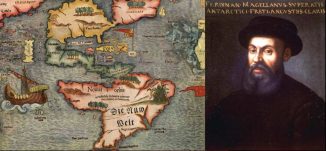
Finally, with his three remaining ships, he landed in the Philippines—the first Europeans to ever arrive—and though large numbers of the population converted to Catholicism (and still remain so, to this day), one island was hostile to the foreign threats and Magellan was killed in battle.
Two vessels quickly turned back, but under the command of Juan Sebastian Elcano, the remaining ship reached the Spice Islands, where it finally collected the long-desired spicy cargo and returned to Spain via the Cape of Good Hope, completing the unintended circumnavigation of the world and proving the Earth was round.
The Victoria docked in a Spanish port three years after setting sail with about 20 surviving crew members to tell the tale—and the western passage around South America has been named the Strait of Magellan ever since. The fearless explorer inspired countless missions over the next five centuries, even into outer space—with NASA naming its successful Venus probe Magellan.
He once said, “The church says the earth is flat; but I have seen its shadow on the moon, and I have more confidence even in a shadow than in the church.”
“The sea is dangerous and its storms terrible, but these obstacles have never been sufficient reason to remain ashore… Unlike the mediocre, intrepid spirits seek victory over those things that seem impossible… It is with an iron will that they embark on the most daring of all endeavors… to meet the shadowy future without fear and conquer the unknown.” ― Ferdinand Magellan
Share the Milestones, Music, and Movies…




















[…] post Good News in History September 20 appeared first on The Good News […]
[…] By Good News Network […]
[…] post Good News in History Sept. 20 appeared first on Good News […]
[…] Source link […]
[…] Posted From: https://www.goodnewsnetwork.org/events060920/ […]
[…] post Good News in History Sept. 20 appeared first on Good News […]
[…] post Good News in History Sept. 20 appeared first on Good News […]